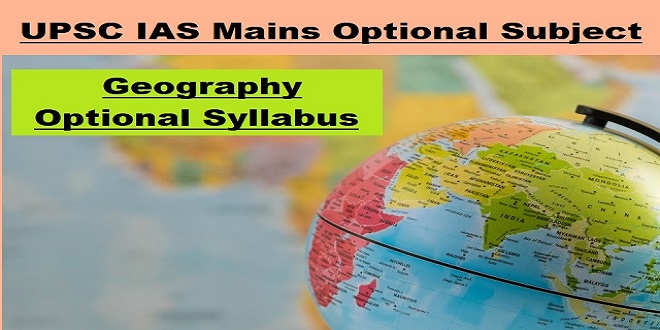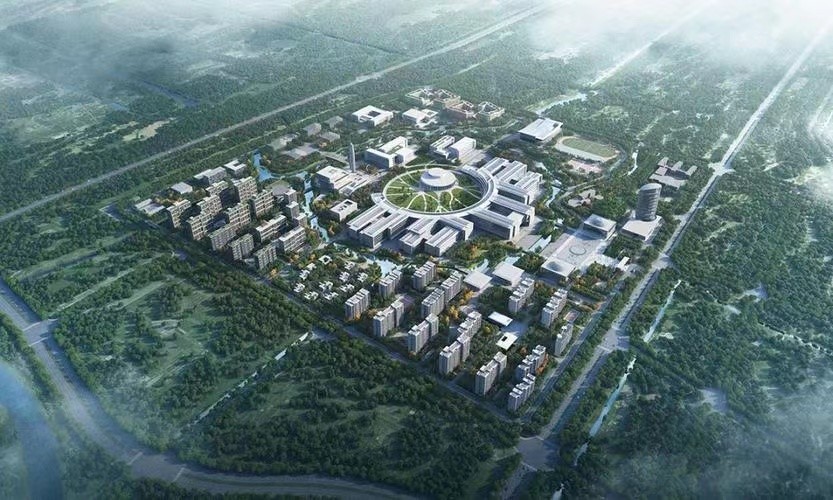Education
All You Need To Know About The Syllabus of geography optional For UPSC mains

Geography is a crucial subject in the UPSC civil services exam, with its inclusion in both the prelims and main exams. It is also a popular optional subject, known for its rationality and scoring potential among candidates from science and arts backgrounds. However, even if you don’t opt for Geography as your optional subject, you cannot ignore its importance in clearing the IAS exam.
Geography Optional Syllabus Paper 1:
- Physical geography : Geomorphology:
- Factors controlling landform development
- Endogenetic and exogenetic forces
- Origin and evolution of the earth’s crusts
- Fundamentals of geomagnetism
- Physical conditions of the earth’s interior
- Geosynclines
- Continental drift
- Isostasy
- Plate tectonics
- Recent views on mountain building
- Volcanicity
- Earthquakes and Tsunamis
- Concepts of geomorphic cycles and Landscape development
- Denudation chronology
- Channel morphology
- Erosion surfaces
- Slope development
- Applied Geomorphology
- Geomorphology, economic geology, and
Climatology:
- Temperature and pressure belts of the world
- Heat budget of the earth
- Atmospheric circulation
- Atmospheric stability and instability
- Planetary and local winds
- Monsoons and jet streams
- Air masses and fronts
- Temperate and tropical cyclones
- Types and distribution of precipitation
- Weather and Climate
- Koppen’s Thorn thwaite’s and Trewartha’s classification of world climate
- Hydrological cycle
- Global climatic change, and the role and response of man in climatic changes
- Applied climatology and Urban
Oceanography:
- Bottom topography of the Atlantic, Indian, and Pacific Oceans
- Temperature and salinity of the oceans
- Heat and salt budgets
- Ocean deposits
- Waves, currents, and tides
- Marine resources; biotic, mineral, and energy resources
- Coral reefs and coral bleaching
- Sea-level changes
- Law of the sea and marine
Biogeography:
- Genesis of soils
- Classification and distribution of soils
- Soil profile
- Soil erosion, Degradation, and Conservation
- Factors influencing world distribution of plants and animals
- Problems of deforestation and conservation measures
- Social forestry, agro-forestry
- Wildlife
- Major gene pool
Environmental Geography:
- Principle of ecology
- Human ecological adaptations
- Influence of man on ecology and environment
- Global and regional ecological changes and imbalances
- Ecosystem management and conservation
- Environmental degradation, management, and conservation
- Biodiversity and sustainable development
- Environmental policy
- Environmental hazards and remedial measures
- Environmental education and
2. Human geography :
The perspective of Human Geography:
- Areal differentiation and regional synthesis
- Dichotomy and dualism
- Environmentalism
- Quantitative revolution and locational analysis
- Radical, behavioural, human, and welfare approaches
- Languages, religions, and secularization
- Cultural regions of the world
- Human development index
Economic Geography:
- World economic development: measurement and problems
- World resources and their distribution
- Energy crisis and limits to growth
- Typology of agricultural regions and productivity
- Food and nutrition problems, security, and famine
- Location patterns and problems of world industries
- Patterns of world trade
Population and Settlement Geography:
- Growth and distribution of world population
- Demographic attributes and migration
- Over-under-and optimum population concepts
- Population theories, problems, and policies
- Social well-being and quality of life
- Types and patterns of rural settlements
- Environmental issues in rural settlements
- Hierarchy of urban settlements
- Urban morphology and primate city
- Functional classification of towns
- Sphere of urban influence
- Rural-urban fringe, satellite towns
- Problems and remedies of urbanization
- Sustainable development of cities
Regional Planning:
- Concept of a region
- Types of regions and methods of regionalization
- Growth centres and growth poles
- Regional imbalances
- Regional development strategies
- Environmental issues in regional planning
- Planning for sustainable development
Models, Theories and Laws in Human Geography:
- System analysis in Human geography
- Malthusian, Marxian and demographic transition models
- Central Place theories of Christaller and Losch
- Perroux and Boudeville
- Von Thunen’s model of agricultural location
- Weber’s model of industrial location
- Ostov’s model of stages of growth
- Heartland and Rimland theories
- Laws of international boundaries and frontiers
Geography Optional Syllabus paper 2:
1. Physical Setting
- India’s space relationship with neighbouring countries
- Structure and relief of India
- Drainage systems and watersheds
- Physiographic regions
- Mechanism of Indian monsoons and rainfall patterns
- Tropical cyclones and western disturbances
- Floods and droughts
- Climatic regions
- Natural vegetation, Soil types and their distributions
2. Resources
- Land, surface and ground water, energy, minerals, biotic and marine resources
- Forest and wildlife resources and their conservation
- Energy crisis
3. Agriculture
- Infrastructure: irrigation, seeds, fertilizers, power
- Institutional factors; land holdings, land tenure and land reforms
- Cropping pattern, agricultural productivity, agricultural intensity, crop combination, land capability
- Agro and social-forestry
- Green revolution and its socio-economic and ecological implications
- Significance of dry farming
- Livestock resources and the white revolution
- Aquaculture
- Sericulture, Agriculture and poultry
- Agricultural regionalisation
- Agro-climatic zones
- Agroecological regions
4. Industry
- Evolution of industries
- Locational factors of cotton, jute, textile, iron and steel, aluminium, fertiliser, paper, chemical and pharmaceutical, automobile, cottage, and ago-based industries
- Industrial houses and complexes including public sector undertakings
- Industrial regionalisation
- New industrial policy
- Multinationals and liberalisation
- Special Economic Zones
- Tourism including ecotourism
5. Transport, Communication, and Trade
- Road, railway, waterway, airway, and pipeline networks and their complementary roles in regional development
- The growing importance of ports on national and foreign trade
- Trade balance; Trade Policy
- Export processing zones
- Developments in communication and information technology and their impacts on the economy and society
- Indian space programme
6. Cultural Setting
- Historical Perspective of Indian Society
- Racial linguistic and ethnic diversities
- Religious minorities
- Major tribes, tribal areas, and their problems
- Cultural regions
- Growth, distribution, and density of the population
- Demographic attributes: sex ratio, age structure, literacy rate, workforce, dependency ratio, longevity
- Migration (inter-regional, intraregional and international) and associated problems
- Population problems and policies
- Health indicators
7. Settlements
- Types, patterns, and morphology of rural settlements
- Urban developments
- Morphology of Indian cities
- Functional classification of Indian cities
- Conurbations and metropolitan regions
- Urban sprawl
- Slums and associated problems
- Town planning
- Problems of urbanisation and remedies
8. Regional Development and Planning
- Experience in regional planning in India
- Five Year Plans
- Integrated rural development programmes
- Panchayati Raj and decentralised planning
- Command area development
- Watershed management
- Planning for the backward area, desert, drought-prone, hill tribal area development
- Multi-level planning
- Regional planning and development of island territories
9. Political Aspects
- Geographical basis of Indian federalism
- State reorganization
- The emergence of new states
- Regional consciousness and inter-state issues
- The international boundary of India and related issues
- Cross-border terrorism
- India’s role in world affairs
- Geopolitics of South Asia and the Indian Ocean realm
10. Contemporary Issues
- Ecological issues: Environmental hazards: landslides, earthquakes, Tsunamis, floods and droughts, epidemics
- Issues related to environmental pollution
- Changes in patterns of land use
- Principles of environmental impact assessment and environmental management
- Population explosion and food
Evolve IAS is one of the prominent IAS coaching institute in Delhi provides online coaching for UPSC mains examinations with the best study materials.




